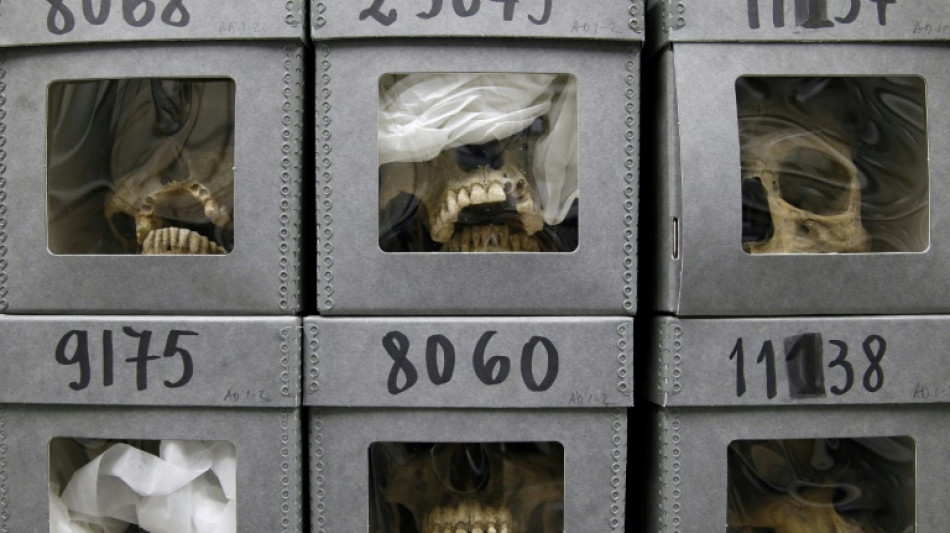
-
 Jailed Russian poet could be 'killed' in prison, warns wife
Jailed Russian poet could be 'killed' in prison, warns wife
-
French court orders release of Lebanese militant held since 1984

-
 Global stocks struggle after Fed signals slower rate cuts
Global stocks struggle after Fed signals slower rate cuts
-
UK economy slows, hitting government growth plans

-
 Primary schools empty as smog persists in Indian capital
Primary schools empty as smog persists in Indian capital
-
Palestinians turn to local soda in boycott of Israel-linked goods

-
 Typhoon Man-yi bears down on Philippines still reeling from Usagi
Typhoon Man-yi bears down on Philippines still reeling from Usagi
-
UK growth slows in third quarter, dealing blow to Labour government

-
 Chris Wood hits quickfire double in NZ World Cup qualifying romp
Chris Wood hits quickfire double in NZ World Cup qualifying romp
-
Markets struggle at end of tough week

-
 China tests building Moon base with lunar soil bricks
China tests building Moon base with lunar soil bricks
-
Film's 'search for Palestine' takes centre stage at Cairo festival

-
 Oil execs work COP29 as NGOs slam lobbyist presence
Oil execs work COP29 as NGOs slam lobbyist presence
-
Gore says climate progress 'won't slow much' because of Trump

-
 'Megaquake' warning hits Japan's growth
'Megaquake' warning hits Japan's growth
-
Stiff business: Berlin startup will freeze your corpse for monthly fee

-
 Wars, looming Trump reign set to dominate G20 summit
Wars, looming Trump reign set to dominate G20 summit
-
Xi, Biden attend Asia-Pacific summit, prepare to meet

-
 Kyrgios to make competitive return at Brisbane next month after injuries
Kyrgios to make competitive return at Brisbane next month after injuries
-
Dominican Juan Luis Guerra triumphs at 25th annual Latin Grammys

-
 Landslide win for Sri Lanka president's leftist coalition in snap polls
Landslide win for Sri Lanka president's leftist coalition in snap polls
-
Australian World Cup penalty hero Vine takes mental health break

-
 As Philippines picks up from Usagi, a fresh storm bears down
As Philippines picks up from Usagi, a fresh storm bears down
-
Tropical Storm Sara pounds Honduras with heavy rain

-
 Pepi gives Pochettino win for USA in Jamaica
Pepi gives Pochettino win for USA in Jamaica
-
'Hell to heaven' as China reignite World Cup hopes with late winner

-
 Rebel attacks keep Indian-run Kashmir on the boil
Rebel attacks keep Indian-run Kashmir on the boil
-
New Zealand challenge 'immense but fantastic' for France

-
 Under pressure England boss Borthwick in Springboks' spotlight
Under pressure England boss Borthwick in Springboks' spotlight
-
All Blacks plan to nullify 'freakish' Dupont, says Lienert-Brown

-
 TikTok makes AI driven ad tool available globally
TikTok makes AI driven ad tool available globally
-
Japan growth slows as new PM readies stimulus

-
 China retail sales pick up speed, beat forecasts in October
China retail sales pick up speed, beat forecasts in October
-
Asian markets fluctuate at end of tough week

-
 Gay, trans people voicing -- and sometimes screaming -- Trump concerns
Gay, trans people voicing -- and sometimes screaming -- Trump concerns
-
Argentina fall in Paraguay, Brazil held in Venezuela

-
 N. Korean leader orders 'mass production' of attack drones
N. Korean leader orders 'mass production' of attack drones
-
Pakistan's policies hazy as it fights smog

-
 Nature pays price for war in Israel's north
Nature pays price for war in Israel's north
-
New Zealand's prolific Williamson back for England Test series

-
 Mexico City youth grapple with growing housing crisis
Mexico City youth grapple with growing housing crisis
-
After Trump's victory, US election falsehoods shift left

-
 Cracks deepen in Canada's pro-immigration 'consensus'
Cracks deepen in Canada's pro-immigration 'consensus'
-
Xi inaugurates South America's first Chinese-funded port in Peru

-
 Tyson slaps Paul in final face-off before Netflix bout
Tyson slaps Paul in final face-off before Netflix bout
-
England wrap-up T20 series win over West Indies

-
 Stewards intervene to stop Israel, France football fans clash at Paris match
Stewards intervene to stop Israel, France football fans clash at Paris match
-
Special counsel hits pause on Trump documents case

-
 Japan's Princess Mikasa, great aunt to emperor, dies aged 101
Japan's Princess Mikasa, great aunt to emperor, dies aged 101
-
Cricket at 2028 Olympics could be held outside Los Angeles

| RBGPF | 100% | 61.84 | $ | |
| AZN | -0.38% | 65.04 | $ | |
| RIO | -0.31% | 60.43 | $ | |
| BCC | -1.57% | 140.35 | $ | |
| CMSD | -0.02% | 24.725 | $ | |
| GSK | -2.09% | 34.39 | $ | |
| NGG | 0.4% | 62.37 | $ | |
| RELX | -0.37% | 45.95 | $ | |
| CMSC | -0.24% | 24.55 | $ | |
| JRI | -0.23% | 13.21 | $ | |
| SCS | -0.75% | 13.27 | $ | |
| RYCEF | -4.71% | 6.79 | $ | |
| BCE | -1.38% | 26.84 | $ | |
| VOD | -0.81% | 8.68 | $ | |
| BTI | 0.2% | 35.49 | $ | |
| BP | 1.65% | 29.05 | $ |

Activist urges repatriation of Native Americans dead in Paris 'human zoo'
The descendant of a Native American teenager who survived being exhibited at a "human zoo" in 19th-century Paris is urging France to repatriate the remains of six others who died there.
Corinne Toka Devilliers says the bones of these six human beings have been lingering in storage at the French capital's Musee de l'Homme (Museum of Mankind) for more than a century.
"They've been in a box for 132 years," she told AFP, indignant.
She is campaigning for them to be returned to their ancestral land in French Guiana, an overseas territory in South America, so they can receive the proper rituals.
In early 1892, 33 Native Americans boarded a ship in Paramaribo, the capital of then Dutch Guiana, which became Suriname after independence, according to Devilliers' research.
Aged just three months to 60 years old, they were children, women and men from the Kali'na and Arawak tribes from the mouth of the Maroni river that today runs between French Guiana and neighbouring Suriname.
Since 1877, a park in Paris had been organising so-called "ethnological shows" of human beings from far-flung continents -- today denounced as "human zoos".
The manager of the Jardin d'Acclimatation, an attractions park in Paris, had requested French explorer Francois Laveau bring back Native Americans to be part of the latest exhibit.
Laveau had promised the 33 indigenous people that he would pay them and that they would return, according to Toka Devilliers.
But "they were never paid and eight of them never again saw their homeland," she said.
- 'Descendants of Moliko' -
Toka Devilliers grew up hearing their tale because her ancestor Moliko, a teenage girl at the time, was among them and survived.
"My grandfather often told me her story, but I didn't pay attention," she said.
But after seeing a 2018 documentary about these deeply racist "human zoos", she decided to take action.
She created the Moliko Alet+Po non-governmental organisation, whose name means "The Descendants of Moliko" in the Kali'na language, to seek reparations for the treatment of her ancestors.
From 1877 to 1931, the Jardin d'Acclimatation hosted around 30 "ethnological shows", according to its website.
They featured people then called "savages" from Africa, the Americas, Oceania, the Arctic and sub-Arctic, some who were paid, it says.
Only "some anthropologists" denounced the events.
Toka Devilliers says that, of the 33 who left Guiana to arrive in Paris in the middle of winter, eight developed "bronchitis or other lung problems".
Of those eight, one was buried and a second was dissected for alleged scientific research.
The remains of the six others are at the Musee de l'Homme.
"If they had known, they would never have got onto that boat," she said.
Toka Devilliers's efforts to repatriate them have so far been in vain.
France's parliament last year passed a bill that paves the way towards human remains contained in its museum collections being repatriated to their countries of origin.
But that law did not include provisions for French territories overseas.
Contacted by AFP, the French culture ministry said it was looking into the issue.
"Discussions are underway to allow us to find the appropriate judicial framework," it said.
- Shamanic ceremony -
Until a solution is found, Toka Devilliers has brought over a shaman -- a spiritual healer -- to conduct a ceremony around the remains at the museum on Tuesday.
Toka Devilliers and her team were able to identify 27 of the 33 people who arrived in 1892.
She is now looking for a copy of the contract between Laveau and the then governor of Dutch Guiana, hoping it will include a complete list of names and details of promised payment.
"Maybe it was just an oral contract," she said.
"Or perhaps the document ended up in the Netherlands after the independence of Suriname" in 1975.
Once she has managed to return the remains of the six, Toka Devilliers says she will continue fighting for the memory of her ancestors.
Next she will seek a plaque inside the Paris park that showed off her people's ancestors to curious visitors, she said.
And she would also like one in France's western port of Saint-Nazaire where they docked, and another in the Paris train station of Saint-Lazare where they arrived in the capital.
The only memorial so far exists in French Guiana.
In August two statues were erected there in memory of those taken to France to be exhibited.
They commemorated another smaller group of people who left in 1882.
W.Nelson--AT



